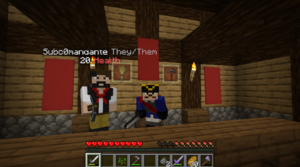Divesk Revolution
| Divesk Revolution | |||||||
|---|---|---|---|---|---|---|---|
| Part of Revolutionary Faru & Farun Conflict | |||||||
 Divesk revolutionaries proclaiming the abolishment of the company town | |||||||
| |||||||
| Belligerents | |||||||
| Mineral Mining Company | ||||||
| Commanders and leaders | |||||||
| De_Remuva (defected to revolutionaries) | |||||||
The Divesk Revolution (French: Révolution Divesque), also known as the Covenant Revolution (Révolution de la convention), was a political process in the settlement of Divesk following the events 23rd of April 2024 that caused the abolishment of the previous corporate government. The new provisional government, whose most agents were members of the Revolutionary League of Shop Stewards organization, enacted policies and programs which seeked to establish a new covenant without castes or creeds in a level society. Similar events occurred in Pen Island. The Revolution was suddenly ended following the supernatural spontaneous disappearance of the residents and revolutionaries of Divesk. The revolution has inspired similar events that followed.
Background
The dissolution of the Slorbo-Glormorian Empire led to widespread social change in the newly independent Faru. However, chaos followed. Opportunists, strongmen, and bandits-turned separatists were the force of law in much of the period. In an effort to grow its and the regions economy, the Mayor of Urbis City and Protector of the Republic Chaton Loupius preempted land for settlement to a corporation. The Mineral Mining Company, the company that gained the land, established the company town as a colony for resource extraction. The Mineral Mining Company Town had little to no democratic organs or politics. The working hours and conditions were worsening and the pay was barely enough to live each day. The raging destruction with the Cossack War in the background led to more dissatisfaction with the current arrangements.
April 23rd Revolution
On the 23 of April, the workers and residents of the Mineral Mining Company marched for change in the city. As their calls remained unheard, the revolutionaries stormed the company and town headquarters with little resistence. The revolutionaries began to self-organize, establishing a new city council and reorganizing the leading company into a cooperative led by the council. The provisional government was called the Miners' and Soldiers' Council of Divesk. n the 23rd of April the workers, including De_Remuva by this point, stormed the company and town headquarters. The head of the council was popularily selected to by Sebastian Azud while the General Secretary of the old company and Mayor of the town remained to be De_Remuva.The day one, the first action of the government included a mining agreement with the Cossacks. Though further relations with the Cossacks ended due to their defeat in the war.
Events since April 23rd
May
- Defeat of the Cossacks.
- The construction of a communal kitchen and hall.
- The construction of a communal apartment complex.
- Head of Council Sebastian Azud joins the Farun Labor Front, quickly disbands.
- Pen Island becomes a sister workers' government.
June
- Construction of a public theatre.
July
- Expansion of food resources and agricultural crops.
- Construction of public art instillation.
August
- Expansion of common lands.
- 1924 Homeless Rebellion
September
- Position of Mayor re-named to Lord Lieutenant.
- Revitalization of former Commodity Brigades to Supply Brigades.
- Treaty of trade with the City of Markarth.
- Revolutionary Divesk Congress started.
- On the 13th every member of the congress as well as the residents of Divesk spontaneously disappeared.
Policies
The Divesk revolutionaries, primarily organized through the Revolutionary League of Shop Stewards, adopted policies of industry and public socialization. These include the expansion of public works and the integration of the economy through measures of self-management. The town had a stance of neutrality to conflicts it is not a part of.

